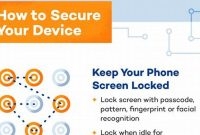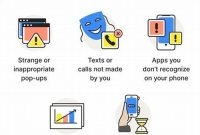As our phones have become an extension of our daily lives, they have also become a prime target for hackers. These cyberattacks can take many different forms, such as malware, spyware, or ransomware, and can result in everything from stolen personal information to complete control of your device. Since many of these attacks can go unnoticed, it’s important to know the signs that your phone has been hacked. In this article, we’ll explore various ways to determine if your phone has been compromised and how you can protect yourself.

How does Phone Hacking Happen?
Phone hacking is a serious concern in today’s world where almost every aspect of our lives is online. It is when an unauthorized person gains access to your device without your consent and can use it for malicious purposes. Hacking can occur through various technologies, but it can also be done through less technical means, such as social engineering. In this article, we will discuss how phone hacking happens and what you can do to prevent it from happening to you.
Exploiting Vulnerabilities
One way hackers can gain access to your phone is by exploiting vulnerabilities in the software or hardware that are not yet patched. Hackers are always looking for these vulnerabilities, so they can use them to gain access to your device. Once they have gained access, they can access all your data stored in the device. Only download and install trusted software on your device, regularly update your device software, and enable 2-factor authentication where possible to prevent hackers from exploiting vulnerabilities.
Malware
Malware is another way hackers can gain access to your phone. Malware is malicious software that can install itself on your device without your knowledge or consent. Hackers often trick users into downloading the malware by hiding the malware in legitimate-looking apps, links, or emails. So, be careful while downloading apps, clicking on links, or opening emails that seem suspicious. To avoid malware, have an antivirus installed on your device, don’t download apps outside official app stores, and have your device up-to-date with malware updates.
Social engineering
The last and most common way hackers can gain access to your device is through social engineering. Social engineering is a technique used by hackers to deceive people into giving up their personal information. They often trick people into giving up their passwords or other sensitive information by pretending to be someone the victim trusts or sending them links or emails that look legitimate.
To avoid becoming a victim of social engineering, verify the source of any call, link, or email, use unique passwords for all your online accounts, and don’t share your passwords with anyone.
What are the Signs that Your Phone has been Hacked?
If you’re one of the billions of people around the world who use a smartphone, you must know that one of the biggest concerns is mobile phone security. You probably have a lot of sensitive information on your phone, like emails, photos, and access to bank accounts. Hence, you must remain vigilant for signs that your phone has been hacked. Here are some of the most common indications that your phone has been compromised:
Sudden Excessive Data Consumption
If you’re using a limited data plan, and you notice that you’ve been reaching your monthly data limit more quickly than usual, it might be due to excessive data consumption by a hacking app running in the background. You can go to “settings” on your phone and check the phone’s data usage to verify if your phone has been consuming abnormally high amounts of data.
Changes in Battery Usage
Your smartphone’s battery drain can be caused by many things, including excessive use, certain apps running in the background, and other technical issues. However, if your phone’s battery life begins to drain faster than usual or your phone gets hot, it could be a sign of malware on your device.
Unusual Pop-up Ads
If you notice that your phone has started showing unexplained pop-up ads, it might indicate that your device has been compromised. You might see ads even when you aren’t browsing the internet or using some specific apps.
Slow or Unresponsive Device Performance
Another sign of a compromised phone is slow or unresponsive device performance. This could be caused by an app running in the background that’s consuming system resources, or it could signal that malware has infected your device.
Unfamiliar Apps Installed on Your Phone
If you find unfamiliar apps on your phone that you don’t remember installing, it could indicate that a third-party has gained access to your device. Usually, hackers will install apps that can run in the background without your knowledge. These apps could be used to access your phone’s data or manipulate your device.
What to do if You Suspect Your Phone has been Hacked?
If you suspect your phone has been hacked, the first thing to do is turn off your device and get in touch with your mobile service provider to seek further guidance. However, there are a few other steps you can take to ensure that your phone is safe and secure.
Check for Signs of Hacking
The first step in determining if your phone has been hacked is to look for any signs of suspicious activity. Some common signs include:
- Unusual battery drain- If you notice your phone’s battery is draining more quickly than usual, it may be a sign that there’s an app running in the background that you’re not aware of.
- Increased data usage- Hackers can use your phone to send and receive data, which can result in increased data usage.
- Unexplained charges- If you see any unexplained charges on your phone bill, it could be a sign that your phone has been hacked.
- Strange pop-ups- If you’re seeing pop-ups on your phone that aren’t related to any app you’ve installed, it could be a sign that there’s unwanted software running on your phone.
Remove Suspicious Apps
If you’ve identified any apps that seem suspicious, it’s important to remove them from your phone immediately. Go to your phone’s settings and open up the list of apps. Look for any apps that you don’t recognize or that are using more data than they should be. If you’re not sure whether an app is legitimate or not, it’s best to err on the side of caution and delete it.
Reset Your Phone
If you’re still concerned that your phone has been hacked, you can try resetting it to its factory settings. This will erase all the data on your phone, so make sure to back up anything important before you do this. Once your phone has been reset, you’ll need to re-install all your apps and set up your phone from scratch.
Remember, prevention is the best way to keep your phone safe from hackers. Make sure to regularly update your phone’s software, use strong passwords, and avoid downloading apps from untrusted sources.
How to Prevent Your Phone from Being Hacked?
Your phone is an important part of your daily life and contains sensitive information. Here are some steps you can take to prevent your phone from being hacked:
Ensure Software is Up-to-Date
Make sure your phone’s operating system and all installed applications are updated to the latest version. Updates contain important security patches that help protect your phone from vulnerabilities that hackers can exploit to gain access to your device.
Avoid Suspicious Links
Do not click on links that are unfamiliar or suspicious, especially in text messages or emails. These links can lead to a phishing site where your personal information can be stolen.
Use Strong Passwords
Do not use easily guessable passwords, such as your birthdate or name. Instead, use a combination of letters, numbers, and special characters to create a strong password. Also, avoid using the same password for multiple accounts.
Avoid Unsecured Wi-Fi Networks
When connecting to public Wi-Fi networks, be cautious. Only connect to networks that require a password and have a secure connection. Hackers can set up fake Wi-Fi networks to trap unsuspecting users who connect to them, allowing hackers to access their device and personal information.
Can a Professional Help Detect Phone Hacking?
If you suspect that your smartphone has been hacked, it can be a stressful experience. An attacker could be accessing your private emails, photos, messages, and even your bank details. It’s natural to want to know if your phone has been breached and what steps you can take to secure your device. Hiring a professional to detect phone hacking can offer peace of mind.
What is a Cybersecurity Expert?
A cybersecurity expert is a trained professional who specializes in computer security and information protection. They are knowledgeable about the latest hacking techniques and tactics used by cybercriminals. A cybersecurity expert can assess the security of your smartphone and identify any vulnerabilities that could be exploited by an attacker.
What Does a Phone Hacking Assessment Involve?
To detect phone hacking, a cybersecurity expert will use specialized tools and techniques to scan your device for any signs of intrusion. They will examine your phone’s operating system, apps, and settings to identify any abnormalities, such as the presence of spyware or malware. Then, they will provide you with a report outlining the issues discovered and recommend ways to resolve them.
What Steps Can a Cybersecurity Expert Suggest to Secure my Smartphone?
After detecting phone hacking, a cybersecurity expert can suggest the following steps to secure your smartphone:
- Update your operating system: Make sure the operating system on your smartphone is up-to-date, as this can fix any security holes that may have been used to gain unauthorized access.
- Install antivirus software: Antivirus software can detect and remove malware from your device.
- Use strong passwords: Set strong and unique passwords for your smartphone, apps, and online accounts.
- Be mindful of phishing attempts: Be wary of unsolicited messages or links from unknown sources that could lead to phishing attacks.
Remember, cybersecurity is an ongoing process. It’s important to stay vigilant and keep your smartphone and data secure.
What Next after Detecting Phone Hacking?
If you suspect your phone has been hacked, it’s essential to act quickly to protect your data and prevent further attacks. Here are some options to consider:
1. Install Anti-Virus Software
Antivirus software can help detect and remove malicious software from your phone, making it harder for hackers to access your data. There are various antivirus apps available on the app store for download. Ensure to choose an antivirus that frequently updates and identifies the latest threats.
2. Reset Your Phone to Factory Settings
If you can’t trace the malware or virus or your device appears to be severely compromised, you may need to reset your phone to factory settings. This process will wipe your device clean, including any malicious files that could be on it. You will lose all your data, but it’s still better to lose data than to compromise your system.
3. Change Your Passwords Immediately
If you suspect that your phone has been compromised, change all passwords and PIN codes on the device and all your online accounts that the phone connects to, including your social media, banking apps, emails, electronic wallets, or any other applications where you may have sensitive information.
4. Limit your Phone to Trusted Networks and Connections
Unsecured public Wi-Fi networks can provide easy access to your device by hackers. Ensure to avoid Wi-Fi networks that do not require a password for connectivity. Also, avoid telecommunication stations that you don’t trust- especially if they offer you a free charging port or internet services, as they can run spyware on your phone.
5. Keep your Phone Software Up-to-Date
Software updates are designed to patch any security vulnerabilities in your device. Ensure to the update your software regularly with the latest versions, including any applications that you have installed on your phone. Your device should be set to automatically download and install the latest software updates when released.
6. Seek Professional Help
Seeking professional help is the last resort if you still can’t figure out how to secure your device. Professionals in the field of cybersecurity can help detect and possibly get rid of the spyware on your phone.
If you believe that your phone has been hacked and it’s putting your data or private information at risk, now is the time to take action. Use the steps above to ensure the security of your information and devices.
Frequently Asked Questions
| Questions | Answers |
|---|---|
| How do I know if my phone has been hacked? | Look out for unusual activities such as slow performance, increased data usage, suspicious texts or calls and unfamiliar apps. |
| What should I do if I suspect my phone is hacked? | Immediately remove all suspicious apps and change your passwords. Contact your phone’s manufacturer for expert assistance and consider resetting your phone. |
| Can hackers access my photos and personal data? | Yes, hackers can gain unauthorized access to your photos, contacts, passwords, and other sensitive data if your phone has been hacked. |
| How can I prevent my phone from being hacked? | Avoid downloading untrustworthy apps and always keep your phone’s software up to date. Always use strong and unique passwords and enable two-factor authentication whenever possible. |
| Can I check my phone for spyware and viruses? | Yes, you can utilize antivirus and anti-spyware software to scan your phone for malicious software. |
Thanks for reading!
We hope this guide proved useful in helping you determine whether or not your phone has been hacked. Remember to stay vigilant and proactive in protecting your personal information and devices against cyber threats. For more helpful tips and resources, visit us again later!





